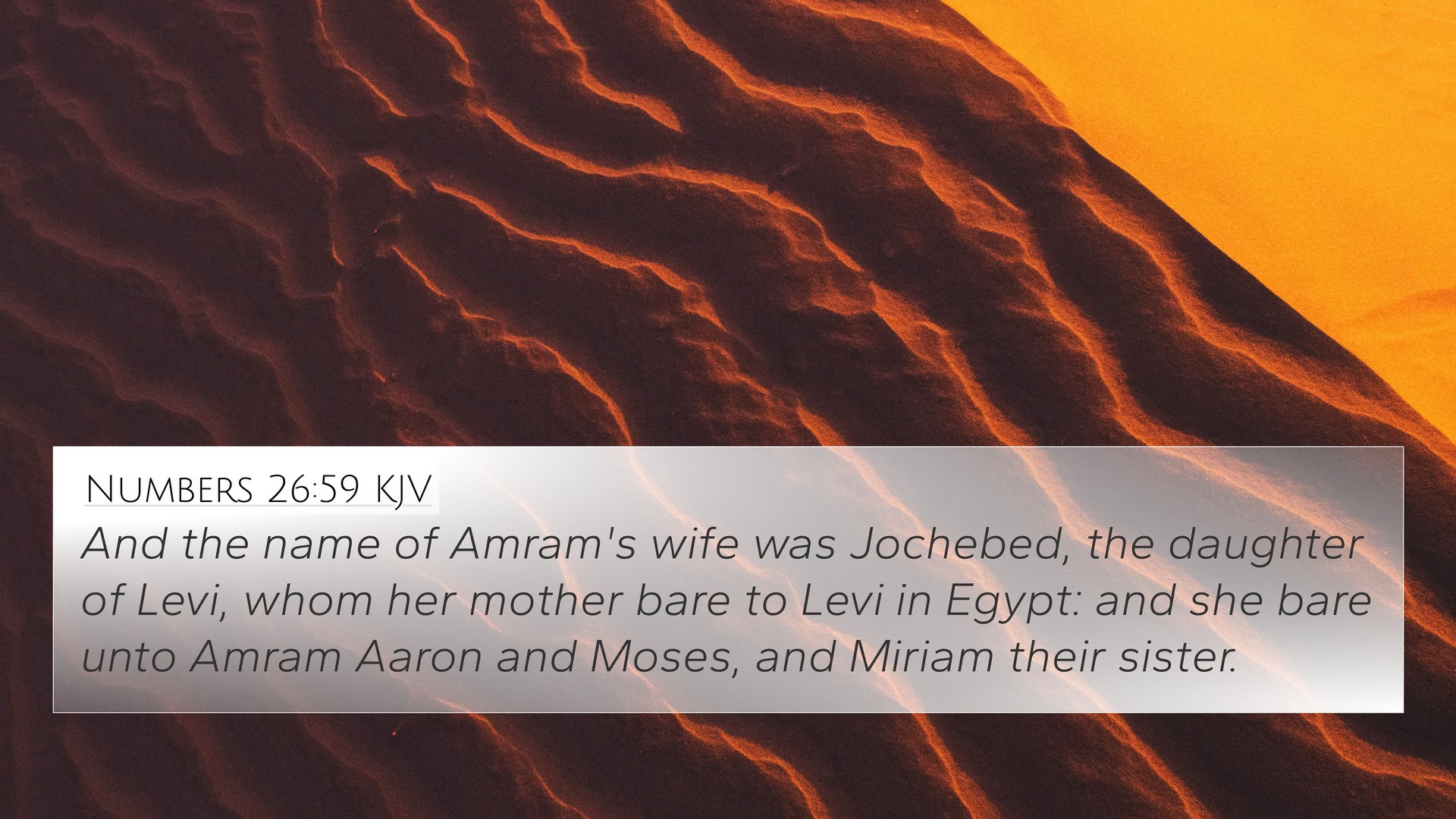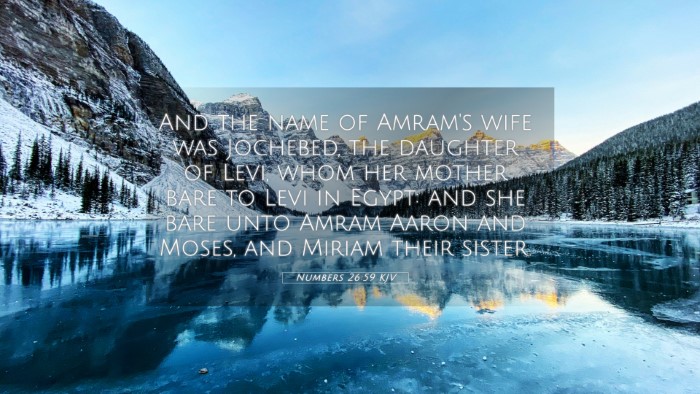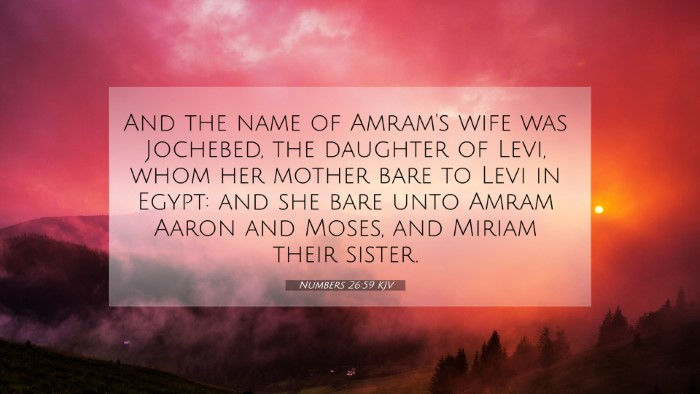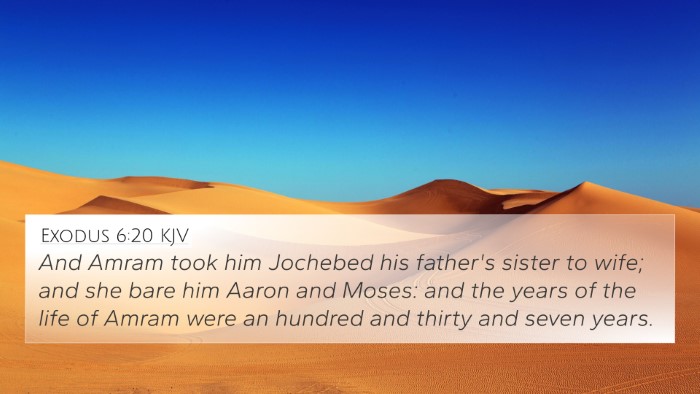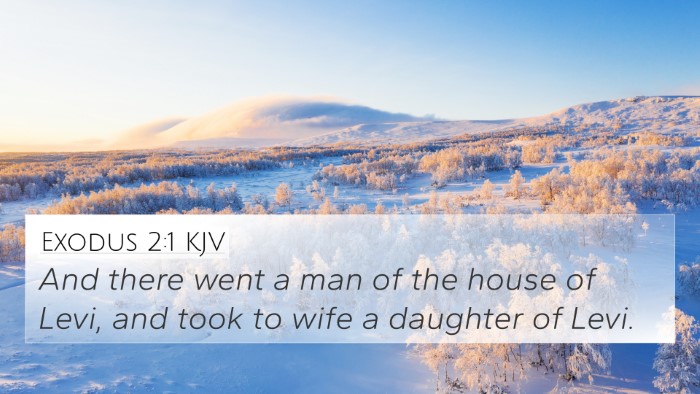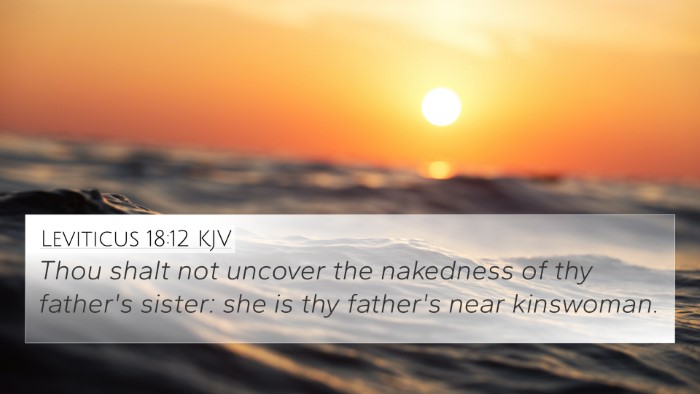Understanding Numbers 26:59
Numbers 26:59 states: "And the name of Amram's wife was Jochebed, the daughter of Levi, whom she bore to Levi in Egypt; and to Amram she bore Aaron and Moses and their sister Miriam."
This verse plays a significant role in the genealogical records of the Israelites and establishes a vital connection between key figures in the Bible—Aaron, Moses, and Miriam—each of whom played a pivotal part in the history of Israel.
Commentary Insights
- Matthew Henry: Henry emphasizes the importance of genealogy in biblical text, noting that familial relationships among the Israelites are crucial for understanding their history and God’s covenant with them. He highlights Jochebed’s noble lineage and her role as a mother, thereby enhancing the significance of her children’s contributions to the faith and nation of Israel.
- Albert Barnes: Barnes expands on the significance of Moses and Aaron, pointing out that their leadership was rooted in their ancestry. He details the implications of Jochebed's heritage, reflecting on how it speaks to God's plan and the divine selection of leaders from within the covenant community.
- Adam Clarke: Clarke provides additional insights into the cultural and societal context of Jochebed's position within the Israelite community. He reflects on the importance of her contributions as a matriarch, noting that her sons played crucial roles in guiding and delivering Israel from Egyptian bondage, thus emphasizing the family’s importance in redemptive history.
Key Themes and Cross-References
Numbers 26:59 provides multiple layers of meaning when viewed through the lens of biblical interconnections. This passage relates to various themes within scripture, highlighting the importance of family, leadership, and God's providence. Below are cross-references that enhance its understanding:
- Exodus 2:1-10: The birth and preservation of Moses highlight Jochebed’s faith and courage.
- Exodus 6:20: Expands upon Amram’s lineage, providing more context to Moses and Aaron’s ancestry.
- Hebrews 11:23: Details the faith of Moses’ parents in hiding him from Pharaoh’s edict.
- Micah 6:4: A prophetic reminder of the leaders God provided to Israel, including Moses and Aaron.
- Matthew 1:2-16: Provides a genealogy of Christ, linking back to the heritage of the Israelites.
- 1 Chronicles 6:1-3: Offers more genealogical data about Levi, reinforcing the significance of the Levite lineage.
- Luke 1:5: Connects the priestly line to Aaron, showing the lasting impact of this family.
Thematic Connections
From a theological perspective, the genealogy in Numbers 26:59 reflects several overarching themes:
- Divine Providence: This verse is a testament to God’s careful orchestration of Israel's leadership through specific families.
- Covenant Faithfulness: The mention of Jochebed illustrates the continuation of God's covenant promises through generations.
- Family Legacy: The significant roles played by Moses, Aaron, and Miriam underscore the impact of family in shaping spiritual leaders.
Guidance for Bible Study
Understanding Numbers 26:59 within the larger biblical narrative can be enriched through various Bible study techniques:
- Bible Cross-Reference Tools: Utilize resources like Bible concordances or cross-reference guides to explore related verses.
- Comparative Analysis: Compare genealogical accounts across books to uncover deeper insights about leadership roles and heritage.
- Identifying Themes: Recognize themes of leadership and family throughout the scripture to draw connections to other passages.
Conclusion
Numbers 26:59 serves as a vital link in the historical and spiritual lineage of Israel. By examining the contributions of Jochebed and her children, and cross-referencing with various scriptures, one can appreciate both the narrative continuity and the thematic richness of the Bible.
Studying the connections between Bible verses allows for a deeper understanding of scriptural messages and the intricate designs of God's plan throughout history.
